Peter Sinkamba is founder and executive director of the nonprofit Citizens for a Better Environment in Zambia. A mining engineer and environmental auditor, Sinkamba helped write the 1996 Zambian Republican Constitution and currently sits on several national environmental committees.
Monday, 1 Apr 2002
KITWE, Zambia
Woke up at 5:00 a.m — far too early, especially after all the fatigue of Easter activities. But I had no choice, because I had an obligation to meet some aggrieved farmers in Ndola, some 40 miles southeast of Kitwe.
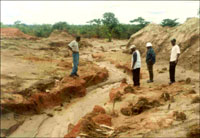
Surveying the damage in Munkulungwe.
The farmers, of the Munkulungwe farming region in Ndola, are upset because the Munkulungwe stream, their water source, has been heavily polluted by the Bwana Mkubwa mine, which is owned by the Canadian mining giant First Quantum. The stream has literally been turned into a tailings dam — all aquatic life-forms have perished, farm animals have been dying, and farmers cannot use the stream water for farming or for domestic use. Mind you, in Zambia, 84 percent of the population is poor and depends heavily on natural resources for survival.
When CBE learned of the development, we confronted the managers of the mine, who opted to settle out of court. An agreement was reached for the mine management to stop any further tailings discharge, provide fresh water supplies to the farmers until the stream returns to its original state, and compensate the farmers for the losses incurred while the stream was unusable.
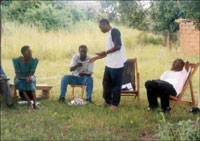
Peter Sinkamba hands out a survey to Munkulungwe farmers.
The purpose of today’s meeting was to distribute a socio-economic impact survey to the farmers and explain briefly what was expected of them. The survey will help us establish the extent of the losses incurred by the farmers, so that we can determine fair compensation.
It took me until 9 a.m. to prepare for the meeting and I left for Ndola immediately afterwards, accompanied by the social scientist Jones Likokoto. Grace-Edwards Galabuz, who works at York University in Canada and helped prepare the survey, was unable to accompany us today due to other commitments.
We arrived in Munkulungwe at 10:30 to find the farmers eagerly waiting for us. We distributed the questionnaire, explained its objective, and surveyed the crop fields, which took us until 5:00 in the afternoon. I promised to meet with the farmers again on Wednesday, and drove back to Kitwe exhausted. Tomorrow, I’ll meet with the managers of the mine — one more step in ensuring that justice is done in Ndola.
Tuesday, 2 Apr 2002
KITWE, Zambia
Today was another early morning; I woke up slightly before 6:00 a.m., just in time to watch the BBC news. The recent events in the Middle East are extremely worrying. I have now developed a habit of following what is happening to people in that corner of the world, and, against the odds, I hope for the best for them.
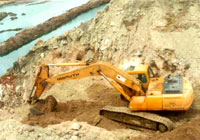
The mines at Munkulungwe.
My original schedule was to leave for Ndola-Munkulungwe before 9:00 a.m. Then I remembered I ought to wait for Bernard Handima, the director of technical services at CBE, who was coming back to the office from Chambishi, a township north of Kitwe. Bernard is a metallurgist and has some 13 years of very advanced experience in the mines.
Usually, Bernard and I go out on assignments together, because I very much value his input. But sadly, my friend and compatriot has not been too well since November of last year. He phoned me yesterday to tell me that he was not going to join me on my mission to Bwana Mkubwa, because he was suffering from coughing, feverishness, and loss of appetite. The news depressed me, and we agreed to meet today first thing in the morning, before I left for Munkulungwe Ndola.
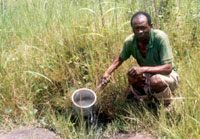
A farmer in Munkulungwe surveys the damage.
Around 10:00, after I helped Bernard through his medical examinations, I left Kitwe for Ndola in the company of Jones Likokoto. If you read yesterday’s entry, you know that the Bwana Mkubwa in Ndola discharged tailings into the Munkulungwe stream, destroying aquatic life and imperiling the livelihoods of subsistence farmers who depend on the water to irrigate their crops.
CBE had been active in trying to see justice done — to restore the stream to its former state and compensate farmers for their losses. Today, Jones and I met with the management of Bwana Mkubwa briefly to formalize our Memorandum of Understanding with respect to supplying fresh water to the farmers. The exact wording of the MOU was an issue, but it’s finished now, and the signing is scheduled for tomorrow.
After the brief meeting with management, I dedicated most of my time in Ndola to inspecting the work being done by mine management to stop the tailings discharge.
I arrived back from Ndola at 5:00 p.m., and called up my friend Bernard to ask him to join me for a cup of tea.
Wednesday, 3 Apr 2002
KITWE, Zambia
I started my day on a very sad note. At 8:30, I rushed to Kitwe Central Hospital to meet my friend Bernard Handima, the director of technical services for Citizens for a Better Environment. The news from the doctor who attended him is not heartening. He said Bernard was doing poorly, and gave him a long bed rest, ruling out any possibility of participation in this year’s Earth Day celebrations. The celebrations, which will begin in three weeks, include Car-Free activities in four towns in Zambia — Lusaka (the capital city), Ndola, Kitwe, and Chingola.
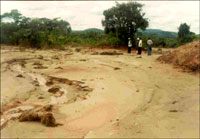
Water sources are running dry in Ndola.
After leaving my friend, I started on my professional business for the day. First on the agenda was a meeting with the beleaguered farmers in Ndola. They urgently need fresh water from a sustainable source — urgently, as in yesterday. And of course they desperately need compensation as well.
I headed to Ndola with Grace-Edwards Galabuz, and on the way we decided to stop in at the regional office of the Environmental Council of Zambia to see a long-time friend, Shadreck Nsongela. Shadreck is the principal inspector for northern regions of Zambia — the Copperbelt, Luapula, Northern, and North-Western Provinces, a huge responsibility indeed.
Fortunately, we found Shadreck in his office. We had a lively, 20-minute discussion, and on the way out the door, picked up some Enviro-News magazines to distribute in Kitwe. Enviro-News is a quarterly magazine produced by ECZ that addresses the latest environmental issues in Zambia.
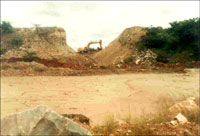
Mining near Ndola.
From Shadreck’s office, we headed for the Bwana Mkubwa Mine. I made an appointment to meet with the company secretary, Andreas Scott, next Thursday. We intend to wrap up our socio-economic survey by interviewing him and probably his general manager. It’s lucky that Scott is available on Thursday, because after that I leave for two weeks in Costa Rica, where I’ll attend the Sixth International Conference on Environmental Compliance and Enforcement. The conference, which will be held April 15-19 in San Jose, is being organized by the International Network for Environmental Compliance and Enforcement Secretariat, based in Washington, D.C. The conference will bring together about 200 governmental officials and nonprofit representatives from over 130 countries.
After I arrange my meeting with Scott, I head out to see the farmers. Most of them requested more time to complete the socio-economic questionnaire Jones Likokoto and I distributed on Monday, so we agree to meet again tomorrow. Before leaving, we brief them on the plans being made by Bwana Mkubwa management to deliver piped water to the farms.
The next appointment on my schedule is a meeting with the head of Zambia Consolidated Copper Mines Investments Holdings, John Patterson. John just came back from London last week after negotiations with the Anglo American Corporation. As you may have heard, Anglo has abruptly pulled out of the Zambia Copper Investment. CBE is planning to take action against Anglo for its premature departure. We believe that mining is not a business like any other — not like selling sweets or shoes or other goods. Mining has serious environmental and socio-economic impacts, which ought to be carefully considered before going into business — and before pulling out. Anglo did not do this and now wants to leave us holding the bag for 70 years’ worth of environmental damage that will cost billions of dollars to clean up. At CBE, we think that’s a scandal, and we’re going to try to stop it.
Friday, 5 Apr 2002
KITWE, Zambia
Another early day — I was at the office by 7:50 a.m. I picked up the paper to read the headline news that the Zambian parliament finally approved retirement benefits for former Republican President Dr. Fredrick Chiluba.
Chiluba’s benefits have been a major source of controversy ever since he left office at the beginning of January. Chiluba designed his own benefits package without seeking parliamentary authorization; as a result, three MPs from the opposition party challenged the legality of the package. The court ordered that he surrender all the benefits, which he did. Now it seems a package has finally been approved.
After reading the news, I rushed to court, where I was representing CBE in a matter in which a supplier failed to replace defective office equipment that was under warranty. Happily, the court ruled in our favor.
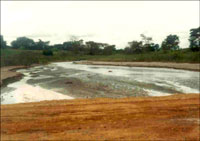
A polluted river in Ndola.
I was planning to head out to Ndola next, but the farmers called to request more time to finish the socio-economic questionnaires we distributed earlier this week. The questionnaires will be used to determine how much compensation the farmers will receive from the mining company that polluted the local water source with tailings. To give the farmers more time, we agreed to put off my trip until tomorrow.
Shortly thereafter, a colleague phoned to inform me that the Environmental Assessment Report for the Copperbelt Environment Project was available on CD-ROM. A copy was waiting for me, so I agreed to pick it up later in the afternoon. CEP is a joint project of the Zambian government and the World Bank; its mission is to clean up environmental disasters left behind when mine owners like the Anglo American Corporation refuse to take responsibility for the messes they have made.
Last year, I was sub-contracted to assist the firm that conducted the environmental assessment for CEP. I provided them with baseline data on Copperbelt as well as information about Zambian law. Later, I was appointed by the government to sit on the CEP steering committee. Last week, the committee adopted the World Bank Mission Project Appraisal and signed the Aide Memoir for the project, paving the way for cleanup to begin in September.
I might have kept working on the CEP project this afternoon, except that my colleague Charles Muchimba, the director of research for the national office of the Mineworkers Union of Zambia, called to invite me to his home. Just a few hours before last month’s union elections, Charles collapsed from a life-threatening bout of cerebral malaria. The illness cost him a possible position as general secretary of the union, but I was relieved to hear that he was feeling better and in the mood for a visit. Sometimes friends are more important than work; I left the office, went to his house, and finished off my week in his company.
Saturday, 6 Apr 2002
KITWE, Zambia
I have very few things on my agenda today: checking my email, making a few phone calls, arranging to pick up the ticket for my trip to Costa Rica next week, and meeting the Munkulungwe farmers in Ndola.
On my way to work, I picked up a couple of newspapers and was distressed to read reports of two mining accidents, one of them fatal. After reading the sad news, I asked a friend in Lusaka to pick up my plane ticket from the travel agency, and then made another call to follow up on an insurance claim on behalf of two families whose children were burnt by sulfuric acid.
The story of the burns is a sad one. Last August, a Zambia Railways train carrying sulfuric acid for use in the mines derailed very close to a mining town, and 80 tons of sulfuric acid were released into the environment. Zambia Railways failed to secure the accident scene, as required by law. Later that morning, two young boys who live close to the derailment went to the scene and started scooping up the pools of acid. In the process, one of the boys burned his face and severely damaged his eye, while the other badly burned his chest. Zambia Railways was focused on getting the acid containers back on the tracks and did not help get the children to a hospital, leaving all care to the parents.
When news of the two children reached CBE, we initiated legal action against Zambia Railways. The company opted to settle out of court and compensate the families. When I called the company’s managing director this morning, the insurance representative promised me the compensation would be available early next week.
After that was settled, Grace Edwards-Jones and I set off for Munkulungwe and arrived around mid-day for our meeting with the farmers. We answered some final questions about the surveys we’d distributed and then began conducting individual interviews. The interviews ran until 4.00 p.m., but we didn’t have time to talk with all the farmers and will have to finish tomorrow.

